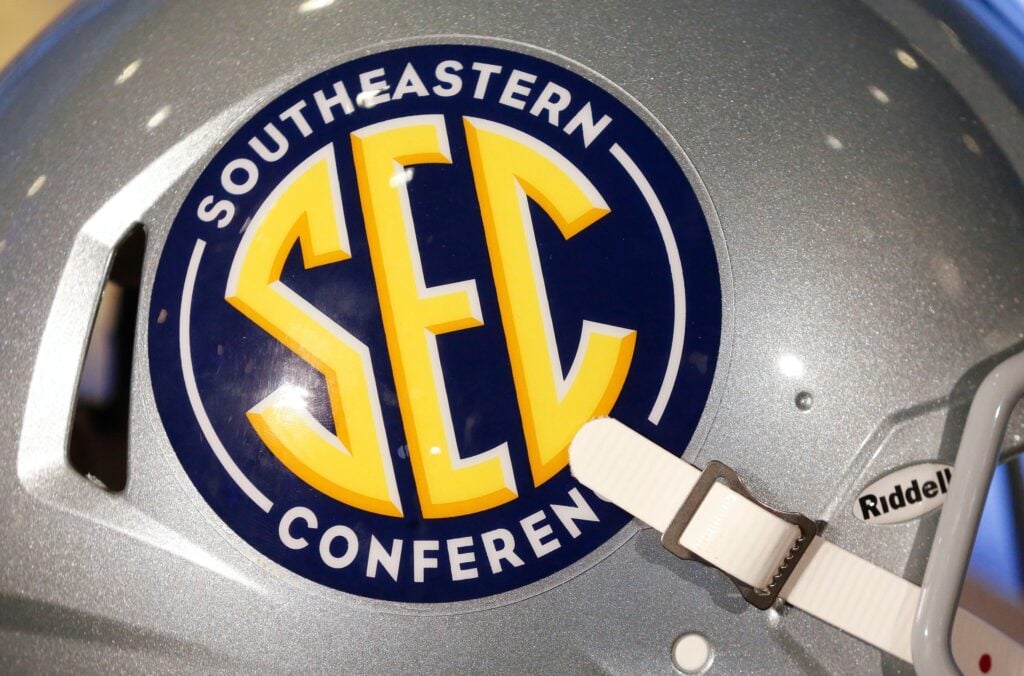
As the college sports world awaits the final ruling on the House v. NCAA settlement, the SEC and the Power Four conferences made an obvious move to protect their new domains. And it sent onlookers into a national tizzy.
All of the final briefs and summations are in the hands of Federal District Court Judge Claudia Wilken. She will either sign off on the settlement, or she will reject it, and we will move on to trial dates and years of motions and appeals. That would mean college sports would stay in their current iteration for years to come. Those who have followed her path throughout the hearings anticipate that she will deliver a decision before the end of the month.
SEC and Power Four Move Forward
In the meantime, schools have been moving in a direction anticipating acceptance of the settlement. They have been signing recruits and portal transfers to contracts that commit to revenue sharing, pending the judicial decision. Many started making roster reductions and are moving back to add some walk-ons back on at the behest of Wilken.
Even as random attorneys who spend far too much time opining on social media are committing to lawsuits if the settlement is accepted, those with skin in the game are moving forward. Even Steve Berman, the lead attorney for the plaintiff in the case, said last week, he hopes the settlement is approved so that athletes can start getting what is owed to them.

Commitment in Writing
But when the Power Four conferences delivered paperwork to the member schools with certain “demands” to follow the new rules and pledge fealty to their conference, it triggered shock and moral outrage throughout the college sports world, and the legal and media entities in particular.
Ross Dellenger of Yahoo Sports was the first to report the required paperwork Monday night. According to Dellenger’s reporting, conference commissioners made it clear that they would be assuming the role of traffic cops in enforcing the new standards resulting from House v. NCAA. The letters made it clear that failure to abide by the rules could lead to the expulsion of a school from a conference. The letters also required a commitment to not suing the conference over its decisions on rules violations and punishments.
The Overreaction
The news came out Tuesday that the Tennessee state legislature had already moved forward with a bill that stated the colleges and universities in the state would not be required to do anything other than follow state laws regarding Name/Image/Likeness, or NIL. The state of Tennessee was basically telling Greg Sankey and the SEC to pound sand.
The reactions across the country sounded surprisingly dramatic, and more than slightly absurd.
The conferences were always going to play a major role in the enforcement of the new rules brought about by the lawsuit settlement. Seriously, did anyone ever assume anything else? The NCAA has been neutered when it comes to rules enforcement. Anytime they try, they get taken to federal court within days and they lose. They don’t enjoy anti-trust protections, despite having run roughshod over college sports for decades.
Today’s Reality Tomorrow
Deloitte, the financial assessment company, will be an advisor on some of the logistics as the new system goes through. But they clearly have no authority to enforce rules. The College Sports Commission and a new CEO will be in place at some point to be a new enforcement mechanism. But as we sit here today, that is still in the proposal/future stage. A decision from Judge Wilken is due any day. The new systems would take place immediately. And someone with the already-in-place contractual authority has to exist at that moment. That would be the conferences. Even with a CSC/CEO in place, their authority could be subject to challenge in the same way the NCAA’s is. And even when the NCAA had its alleged role in rules enforcement, the conferences had a significant role to play in it. So what did anyone ever expect other than this?
There are already those looking for the schools to fight back. But fight back against what? And at what cost? Depending upon the conference, the member schools are pulling in anywhere from $40-$75 million per year in revenue, directly tied to their conference. And that number will go up for the Big 10 and SEC in the next few years with a new TV contract.
In what world does anyone think Arkansas is going to refuse to sign the agreement and cross swords with the SEC? Is Arkansas, or any other school really going to risk the tens of millions of dollars in a move that would blow up their rosters when they cannot come through on the revenue sharing with the athletes? Logic says they will comply.
State of Tennessee Speaks Up
If you are Vandy, and you have committed all this money in recent years to sports complex renovations and upgrades, do you roll with the Tennessee state legislature and thumb your nose at the SEC? The conference has been looking for a way to move you out for years because you are more of a drain in the revenue sports than you are a financial asset.
And what of the legislation from the state of Tennessee? In a bill that was written and passed after the initial settlement was approved by the schools, they are trying to give legal cover to their universities. Contract law experts who communicated with Last Word on Tuesday told us it is both a loud and empty gesture.
While there may have been grumblings behind the scenes, when it came to the official tally, every school in each of the Power Four conferences voted to approve the settlement. That makes all of Tennessee’s universities de facto signatories on the settlement. Of course, they are expected to follow all of the terms. The conferences have a role in rule enforcement now. They can hand out penalties to member schools. Why would they not with the new systems after having each paid millions in legal fees to defend their existence during the litigation?
Settlement and Settling In
There is a potential issue in making a school commit to no litigation if they do not like the punishment they receive for breaking the new rules. Those same attorneys told us that unless such language is in the membership agreement, it likely would not hold up in court.
But there again comes the conflict. If the Vols jump on board with the state legislature, violate the rules, get punished by the SEC, and then sue the conference, they are, in essence, suing themselves. Any legal fees and court costs that come from the SEC having to defend itself in court is going to come out of the allocations given to the schools.
Other than the no-litigation pledge, all of this was totally foreseeable several weeks ago. The national tizzy, not so much.
Main Image: Matt Pendleton-Imagn Images
The post SEC and Power Four Move Forward Throwing Onlookers Into A Tizzy appeared first on Last Word on College Football.